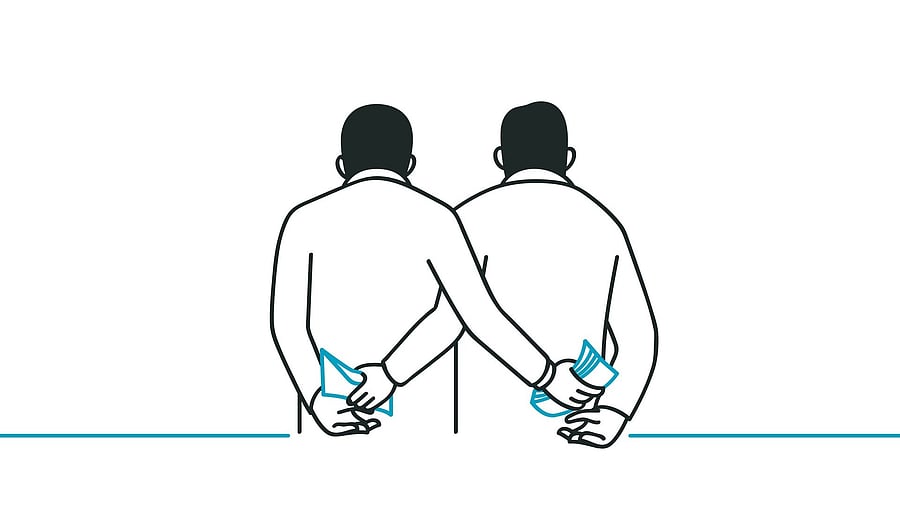
Representative image indicating corruption.
Credit: iStock Photo
Corruption is presumed to be as old as humanity itself, driven primarily by the unbridled greed of man. As long as individuals cling to selfishness, this vice will remain a constant companion. It requires tremendous willpower to resist the allure of wealth. However, it is possible for one to stay untainted by being content with what one has.
I was prompted to dwell on this topic when I came across the Corruption Perception Index by Transparency International (TI). India has dropped eight places, from 85 in 2022 to 93 in 2023, among the 180 countries listed. Our overall score has slipped from 40 to 39 on a scale of 100.
TI, in existence since 1993, aims to combat corruption and promote transparency, accountability, and integrity at all levels and across all sectors of society. Kofi Annan, former UN Secretary General, endorsed TI, saying, “From my own experience, I can say that the United Nations’ work on corruption benefited enormously
from the benchmarks developed by TI.”
So let there be no attempt to trash the report as biased, which is our usual defence against unpalatable truths. Of course, the truth is always galling and unedifying. When somebody calls out the truth, we better take notice.
Let’s see how India compares with other countries. Denmark is named the least corrupt, while Somalia is at the bottom of the pile. India is among the highly corrupt countries, like Kazakhstan and Lesotho. It is no great consolation that there is corruption almost everywhere in the world. Only the degree varies.
All of our political parties talk about ending corruption. They point a finger at each other and strike a self-righteous posture. Sometimes they claim that corruption has gone down. Ask any common man, and you will get a different answer. The scale of corruption has not only gone up, but it has also become so widespread that people have accepted it as a way of life.
There was a time when people tried to vote for a politician with a clean track record. Not anymore! We come across people winning elections even when they are knee-deep in corruption and other misdeeds. Is this not an anomaly? When voters elect them instead of defeating them, how is corruption going to end? Is this not a sign of our moral decadence?
Corruption has many faces. Bribe is the most obvious one, which has been almost accepted as a necessary evil. A certain amount is fixed for each work to be given as illegal gratification. There is an option to give this through an agent if, at all, one has any qualms about giving it directly.
Nepotism is another facet of corruption. When any public office is palmed off to one’s own family, relatives, or cronies, it falls under this category. This is widely practiced by the political class. They accuse each other of dynastic succession, but it is all-pervasive across the political spectrum.
Favouritism falls under nepotism or cronyism. It depends on the finer shades of the same deviance. Even the academic field is rife with this kind of corruption. The appointment of vice chancellors, too, is done for reasons other than academic merit or scholarship. It is even rumoured that the VC’s appointment goes to the highest bidder—scandalous and incredible, but true!
Whoever is concerned about ethical living? People justify unethical living as something that happens everywhere. Do we realise that corruption results in gross injustice and inequity in society? It corrupts both the body and the mind, spreading its tentacles everywhere.
Poverty and corruption are closely linked. One wonders if corruption keeps a country poor or if poverty makes a country corrupt. This is a chicken and egg conundrum.
We have many laws, supposedly to check corruption. We even have some departments solely for this purpose, but still, corruption prevails because they often fail to apprehend high-ranking officials, politicians, and bureaucrats. The law can only trap middle- or lower-level officials and other functionaries. This is a serious lacuna.
When political corruption, such as elected people changing their parties for cash, takes place in almost all parties, there is no use talking about ending corruption. What about huge pay-offs to buy MLAs and form governments? Elections themselves are fought using large amounts of money, and those with money generally have an advantage. When that is the case, how can we hope to see a future that is free of corruption?
We need more than two rivers to clean the Aegean stable. If that can ever be done, we will have one of the most beautiful countries in the world.
(The writer is Director, Little Rock, Udupi)